The Story of Alumnus Eric Williams, BS Finance ‘93, the Businessman Behind Chicago’s Iconic Silver Room and Bronzeville Winery
The Story of Alumnus Eric Williams, BS Finance ‘93, the Businessman Behind Chicago’s Iconic Silver Room and Bronzeville Winery
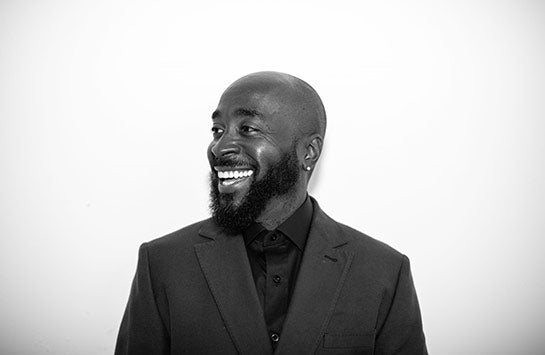
You sway to the music, try on the sunglasses, inhale the fragrant incense, delight in the smell of candles, savor every bite of food, sip fine wine, and most importantly, experience what it means to be a valued customer. These are defining experiences of The Silver Room and the Bronzeville Winery, iconic and wildly popular businesses located on the South Side of Chicago. But did you know that the founder of these revered establishments is a UIC Business alumnus?
Eric Williams, BS Finance ’93, is a Chicagoland area native who learned early in life that he was gifted in a skill that would eventually help him become one of the most recognizable entrepreneurs in the city: sales.
From transfer student to finance intern, to street peddler, to businessman focused on culture and community, Eric’s story is one to know.
Our exclusive interview with Eric is detailed below.
The Story of Alumnus Eric Williams, BS Finance ‘93, the Businessman Behind Chicago’s Iconic Silver Room and Bronzeville Winery
Eric, what is your hometown?
I was born in Harvey, Illinois, but I was raised in Robbins.
Tell me the story of why you chose to pursue a bachelor’s degree in finance at UIC Business.
My father owned a bar and was the first small business owner that I knew, but he didn’t attend college. My mom taught in the CPS system and was a schoolteacher for 40 years. She was all about going to college. I didn’t know where to go. I mean, I was from Robbins. However, there was a scholarship available for Black people, perhaps even Black men, who studied in the College of Business at NIU. If you selected either marketing, advertising, accounting, finance, or econ, you could go to school for free. And so, my mom was like, “Well, we ain’t got no money. So, you better pick one of these things.” I asked which of those five majors could probably make the most money. They said finance is what makes the most, and I’m like, “Okay, I’ll do that.” [Laughs].
I actually transferred to UIC from Northern [Illinois University].
So, you went to NIU freshman and sophomore year. Is that right?
Sophomore and junior year. I went for three years.
Oh, okay. And then you spent your last year at UIC?
Two years, because when I transferred, I lost a bunch of credits.
The Story of Alumnus Eric Williams, BS Finance ‘93, the Businessman Behind Chicago’s Iconic Silver Room and Bronzeville Winery

Can you describe what your student experience was like at UIC?
My student experience is a bit of a blur. But I remember taking school more seriously at UIC, and that I enjoyed my classes. Maybe this was because I was older, back in the city, and I was happier. But one thing I started doing was working out a lot. I was in great shape and I’ll never forget that. So, the gym at UIC now, was not there. This gym was across the street. A small gym tucked away near the upstairs cafeteria. I worked out five days a week for the entire school year. By the end, I was like, buff. So, my memory of UIC was working out a lot. I also met some friends, and we’re best friends to this day.
Not only did I take school more seriously and do pretty well; I also discovered Maxwell Street. That’s how I got into what I do right now.
In the early to mid-’90s, Maxwell Street, which is just south of Roosevelt, was a huge open-air market. There were wholesale places where we sold t-shirts, incense, bootleg jeans, and all that stuff. Just south of that was a big, huge market and that’s where everybody sold stuff: tools, videos, socks, you name it. I would go down to the market, and I met these guys who were both selling t-shirts. I didn’t know you could buy stuff wholesale and resell it. So, I start working for this guy to pay for college and that’s how I became a street vendor. At UIC, I ended up paying almost nothing. I probably paid about $4,000 for the two years I was there. I paid, like, nothing. I would be on the train selling peanuts, socks, t-shirts, sunglasses, you name it. That’s what I did during the summer. I was a street vendor.
The Story of Alumnus Eric Williams, BS Finance ‘93, the Businessman Behind Chicago’s Iconic Silver Room and Bronzeville Winery
What are your fondest UIC and/or UIC Business memories?
Being in the city was really my memory. The fact that I was back in the city and had access to everything that was close to me. I was like, “Oh wow. This is a university in the middle of the city.” I thought about college being somewhere distant or even in a farm area. I enjoyed music and parties, but I wasn’t a partier, and UIC didn’t have a place to party because the campus was in the city. I had the chance to kind of go out and really explore the city as a student. I’d get on the train and go downtown. I’d go to the nightclubs and restaurants. I think it’s more about exploration when it comes to being at a place like UIC. So, my memory was really just me having a chance to learn about myself through the landscape of being in the city.
At what point in your life did you decide that you would become a successful business owner?
My plan was that I was going to study finance. I would get my Series 7 and do stocks, trading, or investment banking. I got my Series 7 and Series 63, and I started working in finance. After nine months, I was like, “This sucks.” I didn’t want to do it. I’m thinking, “I got this degree, this is what I thought I’d be doing, and then realized, shit, I don’t want to do this.” So, I quit my job and didn’t really have a fallback.
I just started street peddling again. I had to start selling stuff on the streets to make money. I had been doing that for three years. Every summer I would sell. I’d be on the corner of Chicago Avenue and Rush selling t-shirts. I used to sell sunglasses on the beach. I started traveling around the country selling t-shirts: Freaknik, Caribana, the New Orleans Jazz Fest, Black college football games, and certain City Classic football games. I also learned how to print shirts. We started printing bootleg Chicago Bulls t-shirts and bootleg Bulls paraphernalia. They would win a championship, and I used to make thousands of dollars selling Bulls stuff.
I have this thing for selling. I thought it’d be for one or two years and then I’d figure out what my next step was, but I just kept street peddling. By this time, I knew how to get stuff wholesale. I knew where to buy stuff from. Honestly, I knew the business side of this from being on the streets. Eventually, I said to myself, “Well, if I can do this on the street, I can do it inside.” And then I found the storefront in ’97. I didn’t have a ton of money, so what I was selling in the store was kind of the stuff I was selling on the streets. I was selling cheap sunglasses, watches that I bought in New York on Canal Street, random jewelry… I also had a love of music and art and wanted to add that element to the store too.
I was DJing, and all my friends were artists. Visual artists, poets, etc. So, I could have this store and incorporate an artistic vibe on top of retail. That was always the concept which, to this day, is still the same. After that, I opened the store and said, “Let’s see what happens.” The [27th] anniversary is December 13.
The Story of Alumnus Eric Williams, BS Finance ‘93, the Businessman Behind Chicago’s Iconic Silver Room and Bronzeville Winery
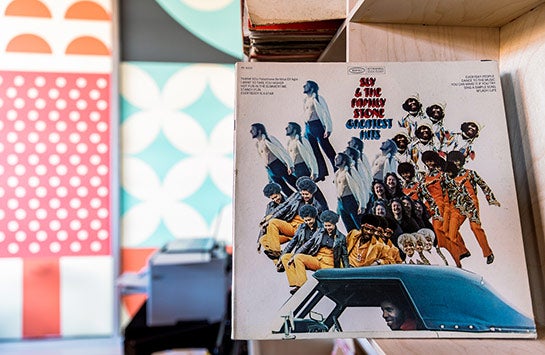
Now those sound like great memories [both laugh]. When it came to following your dreams, who has been the most influential to you?
It’s probably been two or three people. One is this guy, named Tino, who I’ve reconnected with. He’s the one who got me into street peddling. Back in the day, when I was in college, I was working at Taco Bell. Minimum wage was $3.35 an hour. That’s what I was making. You can look it up. And then I think it went up to $4.15. So, I got a raise from $3.35 to $3.50 to $4.15. I think I might have topped out at $4.75 or $5.25. Tino said to me, “You’re making four, five bucks an hour. How much does a t-shirt cost wholesale?” I said, “Three bucks.” That was the price of the shirts we bought. Then, we would sell them for $10. He and I were downtown at the time, and he goes, “You think you can sell one t-shirt to all these people walking past? Can you sell one t-shirt per hour?” I’m looking at the people walking around, and I’m like, “Yeah, I can sell.” He says, “You sell one shirt an hour, it’s seven bucks. You think you can sell two an hour?” I say, “I could probably sell five or six or seven.” Tino replies, “You sell seven shirts an hour, that’s 50 bucks an hour.” He was right. I didn’t think of it that way.
I quit my job so quick [laughs] and I started making good money. Even back then, I was clearing $100-$150 bucks a day at 19 years old. Tino taught me that business doesn’t have to be traditional business. This idea of street peddling, most people look down on. So here I was, this finance major, and I’m selling stuff on the streets. But when I had my internship, I was making more money with street peddling. With finance, I had just started and was cold calling. With street peddling, I was making $1,000 bucks a week when I was 19 years old. This was back in the early ’90s. That’s a lot of money. And it was in cash. So, this guy, Tino, was probably most important.
This other guy I met knew that I was in college. I was going down to Maxwell Street one day and he said, “I know you’re in college. I know you’re trying to do something for yourself. I’ll front you some t-shirts and just pay me after you sell them.” I thought that was great. He would give me stuff from consignment, I’d go sell and bring the money back. He trusted me.
Another guy got me into selling sunglasses. To this day, I still sell sunglasses because of him. He was a street peddler who wound up getting a store called Sun King Optical. He opened one store on Chicago Avenue, another store in Lincoln Park, and another store in Evanston. He eventually sold the business to Sunglasses Hut for $2 million dollars.
So, it was those three guys who showed me the ropes on the streets. Those three guys for sure.
The Story of Alumnus Eric Williams, BS Finance ‘93, the Businessman Behind Chicago’s Iconic Silver Room and Bronzeville Winery
What is the best piece of business advice that you’ve ever received? Who did it come from?
There’s a lot of good advice that I learned over the years. One piece of that advice was from my friend Tino. I remember the first year that I was selling merchandise. The weather was great, and I was making good money. It would be 6 p.m. and I’d say, “I made my quota for the day.” $1,000 bucks or whatever I made. “I’m about to go home.” Tino said, “Man, you should keep working because you’re not always going to have time to make money. You have certain seasons to make money. When you have that time, you got to take advantage of it.”
Sure enough, winter came and I’m like, “I should have been making money when I had the chance to.” So, take advantage of the time and the situation you have when they’re there. Those opportunities are not always there. So, I’m always aware of when a season is mine. If somebody gives me a chance, I might not have that chance again. I take it right away.
Next, know that this is a long-term thing. This is a long-term game. It’s not one day a week, month, or even one year. You have to look long term and plan. Say to yourself, “Okay, I’m going to have my ups and downs in any business.” Retail, restaurants… You’ll have a pretty great day where it’s really busy. Then it rains and you’re super slow. Then somebody calls off work. If you react to these things on a daily basis, you’ll be all over the place. “Ohhh! It’s slow! Ohhh! It’s busy!” You can’t do that. Have an even-keeled temperament and think long term.
And treat everybody the same. I think my street peddling experience taught me that. I remember when people would see me selling t-shirts, they’d view me one way. Then, when I was doing my finance thing, they would treat me differently. I was the same person, I just had a suit on.
Being on the streets, I’ve met all the underground people you can think of. All the hustlers. All the folks. You realize that people are kind of all the same. People just have harder times and harder journeys. But sometimes, those are the people you trust the most, you know? I realized that you can’t judge people based on anything, be it their race, their gender, where they live, their income, nothing. Everybody is kind of the same.
The Story of Alumnus Eric Williams, BS Finance ‘93, the Businessman Behind Chicago’s Iconic Silver Room and Bronzeville Winery
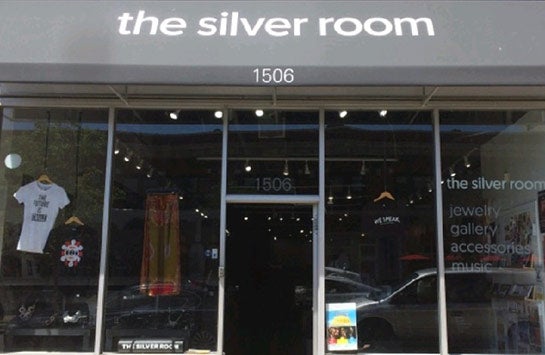
The Silver Room is a space for visitors to immerse themselves in cultural goods, intellectual talks and music. The Bronzeville Winery is synonymous with great food, carefully curated wines and cultural engagement. What sparked your ideas for these businesses?
The store was born out of several things: me being a street vendor learning how to buy and how to sell stuff, and my love of fashion. My mom was really into fashion, art, and music. It’s definitely a collision of my background in finance, business, arts, and culture. That’s what the story is. How can you incorporate this into a retail space? Because culture is not just transactional. The music that plays, it’s intentional. Incense is burning. The people who work there play the guitar. Employees are whole artists. All the stuff that I do came out of that. The art shows, book signings, story nights, the record release party, and eventually, the block party. All those things are things that I like. But it all kind of stems from the store.
The Bronzeville Winery is like a second iteration of The Silver Room. I look at it as if you’re going to a sister version of The Silver Room to have food and drink. Again, really focused on music and really focused on the food. But it’s all different ways of expression. With retail, you express yourself to those who make earrings or bracelets. In the culinary and hospitality industries, it’s the same thing. You’re making food. You’re curating a wine list. It’s very service oriented. So, to me, the music and the pacing of the day are like when you’re DJ’ing. You think about pacing. It might start up a little slow, then you build, and by the end of your set, you break it down. That’s how I look at a restaurant. You come in and there’s a certain amount of energy and excitement. You eat your appetizers, then you build to the entrée. After a couple glasses of wine, you leave, and you leave feeling good. That’s the whole point. You’re like “Oh, that was cool. I’m going to come back.” It was a unique experience for you.
So, The Silver Room and Bronzeville Winery are similar in some ways. The operations are very different between retail and the restaurant, but the point is to make it feel good. To make people feel like they have a space that they can identify with. A space that they can call home. A space where they can hear some music they like, see some old friends, and celebrate. The Silver Room and Bronzeville Winery are the same in that regard.
The Story of Alumnus Eric Williams, BS Finance ‘93, the Businessman Behind Chicago’s Iconic Silver Room and Bronzeville Winery
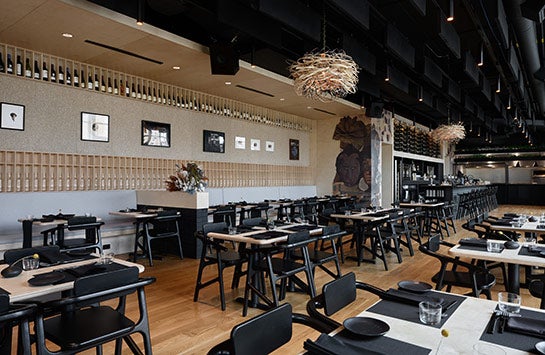
What challenges, if any, did you face when working to open The Silver Room and the Bronzeville Winery? How did you emerge on the winning side despite those roadblocks?
There were two different kinds of challenges. Back then, there was a different climate, different kind of neighborhood, different set of economics. I was 27 years old and now I’m 53. So, a lot of things were very different. The Silver Room first opened in Wicker Park. It was in Wicker Park for the first 17 years. The retail space that I rented out was $800 a month. $800 a month on Milwaukee Avenue. The space was empty for months and was like an old hair salon. It was small. Maybe 1,000 square feet. I also didn’t have any money. I remember my first rent check bounced. Actually, I didn’t even have the money for my deposit, but I had signed the contract already.
So, I was constantly selling t-shirts. I was street peddling during the day and delivered pizzas at night for a place called Big Tony’s. I did that for a couple years. And I was a courier. I would drive and deliver packages. I was just hustling, you know? I didn’t have tons of money, but I never really had a fear, necessarily. I said to myself, “Well, if it don’t work, it don’t work.” So, I found the space, signed the lease, went to Home Depot, and got some paint. I mean, I think I ended up with $7,000 for the entire business. That was for my first month’s rent, all the merchandise, everything. I had $7,000. I borrowed some money from my mom. She gave me about $2,000. My other friend gave me about $2,000. And I had three or four thousand. When you don’t have a lot of money, you make it work. Ideally, I would’ve had 30 different watches in the store, but I had ten. I would sell those ten and build up.
Looking back, it wasn’t as much pressure as it is now. Nobody knew me and the neighborhood wasn’t what it is now. People were happy that I was there. Like, “Oh, a store on Milwaukee Avenue? This is cool.” I made it look cool with a little bit of money. That was very endearing in many ways.
Fast forward to Bronzeville Winery, that a whole other thing. Now you have to come correct. We were partially funded by the city of Chicago. Overall, the place cost me over a million dollars. You’re talking about a million dollars compared to $7,000. There’s also operating capital and insurance. When I opened The Silver Room, it was just me. I didn’t have any employees. At Bronzeville Winery, we have 40 people who work there now. So, it’s a whole different kind of thing.
Now, people know me. It’s not like when I first opened and nobody knew who I was. There were less eyes on what I was doing. There are pros and cons to that. When you open a space like the restaurant, I already had 25 years of customer base. It was like, “Hey Silver Room people, we’re doing something else.” It was automatic, I suppose. There was a tie in that made a lot of sense, and 25 years of making mistakes and learning things. Even though it’s a different business, I still had a little bit of a reference point on how to be successful.
The Story of Alumnus Eric Williams, BS Finance ‘93, the Businessman Behind Chicago’s Iconic Silver Room and Bronzeville Winery
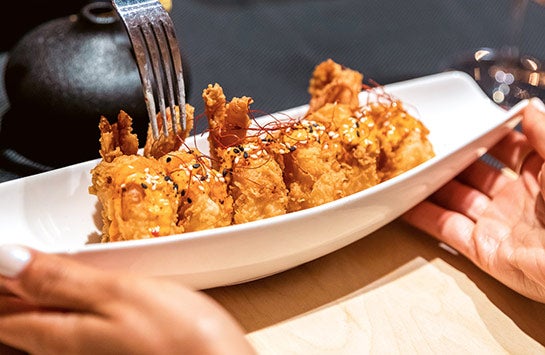
The Silver Room and the Bronzeville Winery are symbols of culture on the South Side of Chicago. What inspired you to say, “I want to establish something here, in this part of Chicago?”
If we talk about the Silver Rooms, both locations, and the Bronzeville Winery, that’s three totally different answers. With the first Silver Room, I chose Wicker Park because of this guy I met when I was street peddling. His name was Kendall, and he had a bookstore called Literary Explosion. His bookstore was like the hub of the early ’90s. Black, dreadlocks, poetry, hip hop, Common… Imagine Common. Imagine poetry and Love Jones. That kind of vibe. Literary Explosion was in Wicker Park. A lot of the Black folks who were from the South Side discovered Wicker Park as an alternative community. They could be themselves and not, in some ways, be constrained to what we have to be when we’re in certain neighborhoods on the South and West Side, you know? It was a different kind of sense of freedom. It was really diverse, though. It was an eclectic mix of people.
Kendall let me put my merchandise in his bookstore that was on the corner of Damon and Milwaukee. I would sell items during the day. At night, I would put my stuff in the store. At the time, I started selling silver jewelry, jeans, and some other things. This was in the mid-’90s, Wicker Park was starting up, and there was a Black bookstore. I’m like, “Oh, this neighborhood is kind of cool.” Then the neighborhood started to change. I told Kendall, “You ain’t gonna stay in business selling books.” [Laughs]. But the jewelry that I was selling was making money. Anybody can buy jewelry. And the neighborhood was also a place of house music. So, I started to fall in love with the neighborhood and the people started to know me. I figured, “Well, the store has to go here because I’m in this neighborhood.” That’s why I put The Silver Room in Wicker Park. I became familiar with the neighborhood and people knew me from Kendall’s bookstore.
After some time, the University of Chicago asked me to move down to Hyde Park, and they offered me a super great deal on the space if I agreed to move. When my lease ended in Wicker Park, I was going to re-sign and open two stores. But my rent was sky high, and the neighborhood was changing because of gentrification. I wasn’t digging the neighborhood anymore. So, the University of Chicago said, “Hey, we’ll give you a really great deal if you move down here.” And I said to myself, “Let me just try this.” That’s why I moved. It was because of UChicago. I moved to Hyde Park, a great location; and that was probably the best decision I made for business. It was two to three times busier than I ever was in Wicker Park. The vibe was different. The Silver Room worked in Wicker Park while it was there. Then, it fit way better in Hyde Park.
When I moved from Wicker Park to Hyde Park, I couldn’t find an apartment. I had to move pretty quickly, and I couldn’t find an apartment in Hyde Park to be close to the store. Eventually, I moved to Bronzeville and thought, “I’ll stay here for one year.” Then, I moved to Hyde Park and one year turned into two years, then three years. But I was in Bronzeville for probably six or seven years. I lived on Drexel, Kenwood, King, and Cottage. I got to know Bronzeville, and a lot of my friends lived there. I’m like, “All my friends live around here and there’s nothing to do.” There was nothing to do in Bronzeville and I found myself going out to eat in the West Loop, on the North Side, or at Virtue, owned by my friend, Erick Williams. But there was really nothing in Bronzeville at the time.
But when the development was opening, the one where Bronzeville Winery is located now, QCDC, the development company, was looking for small business owners to occupy spaces in there. It’s funny. My friend Tony was working with the developer and all he said to me was, “Do a business over there.” I thought he meant The Silver Room at first, and I said to him, “No, I’m good here [in Hyde Park]. I know what this neighborhood needs.” But then I thought about how there was no place to have a glass of wine in Bronzeville. A good place in a nice restaurant. I thought, “Okay, if I want this kind of space, other people might want it too.” So, then I had a clear idea, a vision, of what it could look and feel like.
Initially, I had one space in the development, then I came back a week later and said I wanted two spaces. So, Bronzeville Winery is actually two spaces. And I also had another idea. I wanted it to be an ode. The name is not the most original, and that’s done on purpose. I wanted to lead with the name Bronzeville because it would put something in people’s minds about this community that would, hopefully, be positive. Then there’s the wine bar. Bronzeville Winery is not a winery, but I just decided to call it that. So that’s where the name came from.
The Story of Alumnus Eric Williams, BS Finance ‘93, the Businessman Behind Chicago’s Iconic Silver Room and Bronzeville Winery
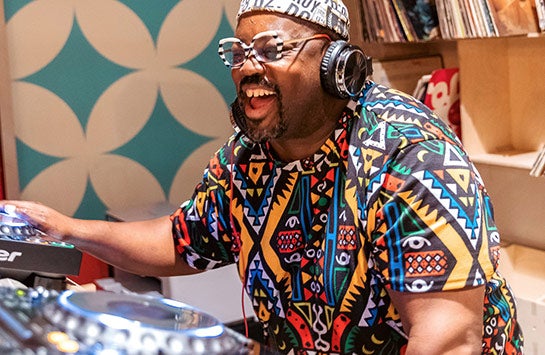
In your previous interviews with Chicago local news outlets, you mentioned that the high cost of production led to the decision to end the Silver Room Block Party. Was this decision difficult for you to accept, or did it produce a sigh of relief?
A sigh of relief. When the block party first started, it was a couple hundred bucks to a couple thousand dollars. It wasn’t that big of a lift. For the first 16 years, it was free to attend. Then the more people that came, it started getting more and more expensive. But initially, I’m like, “Okay, I can spend a couple thousand dollars. It’s not that big of a deal.”
But then, ten thousand turn to twenty, thirty, fifty, and one hundred thousand. People don’t realize, the more people that came, the worse it was for me. I could justify spending $20,000 out of pocket. But I can’t justify $100,000. So, I said, “Well, I have to figure out how to pay for this.” Now I’m trying to get sponsors. Now I’m charging vendor fees. We asked for donations, and people didn’t donate. Then, in the last couple years, I figured I had to sell tickets. There was no other way to do it. So then, everyone was like, “What? It used to be free. It used to be free.” I had to explain to people that I was paying this debt out of pocket. I can’t pay for it for 30,000 people. It just got super tiring explaining this over and over again.
I lost a ton of money in 2022, the first year the Silver Room Block Party was a ticketed event. I miscalculated the expenses and the income that we received from ticket sales, sponsorships, and vendor fees. We were also coming out of COVID. I raised some money, but I spent way, way more. I lost significant amounts of money. I was reeling from that all year and decided to do the event again in 2023. We didn’t lose as much money, but we still lost.
It was a great time, but it just became too popular. Too many people were coming. To me, it was almost like a safety hazard where you couldn’t walk down the street. You couldn’t move. If something happened, I would be liable for all those people. I couldn’t keep packing people into a street.
I think people really liked the energy. But for me, I was like, “I’m going to spend all this money… You can’t walk down the street…” It wasn’t fun to me.
The Story of Alumnus Eric Williams, BS Finance ‘93, the Businessman Behind Chicago’s Iconic Silver Room and Bronzeville Winery
The block party was once somewhere else? Up North, correct?
Most of the block parties were in Wicker Park. Actually, they were in four locations. So, the first two were at 1410 Milwaukee Avenue, literally in an alley. The next 10 we did down the street on a small, little street on Evergreen. Then we moved it to Hyde Park. We did four in Hyde Park, and then we did two on the lake. We only sold tickets for the last two.
For 18 years, the Silver Room Block Party was a time for community members to come together in harmony and celebrate Black culture through music, food, and art. What is the possibility that we will see this iconic event make a return?
Honestly, I never say never. But right now, I’m not even thinking about it. I have to recover from the last couple of years. It would have to make sense for me to do it again. First, it involves a lot of money and time. Then I have the restaurant, I have the store, and I also have a daughter. There’s so much that goes into the event. Producing the event is not hard. You hire somebody to help you, and I have the people that work with me. With the logistical stuff, once you have the CAD drawing down, then it’s, “Okay, we need the stage here. We’re going to do a 250 stage. We need this kind of sound system and this kind of generator.” That’s the infrastructure and I know how to produce this event.
I also know how I want the block party to look and feel. Then there’s the performers. We know a thousand DJs. Maybe we want to have an old school house DJ. I know how I want the day to flow. That part isn’t hard. The hard part is finding the money. I spent a lot of money and time just trying to raise money through conference calls, sponsorships, and pushing tickets. It takes a whole year to plan. Then, I have other businesses to run. The Silver Room is a 27-year-old business. Then there’s Bronzeville Winery, another hard business. It’s just too much. So, if somebody was writing me a check, or if I could raise a million dollars, which could underwrite the event, then I wouldn’t have to worry so much about all of this. I could produce the Silver Room Block Party and just do it. If someone’s writing me a check, then yeah. But the event is not something I’m going out to actively seek. I need time to rest for a little bit.
The Story of Alumnus Eric Williams, BS Finance ‘93, the Businessman Behind Chicago’s Iconic Silver Room and Bronzeville Winery
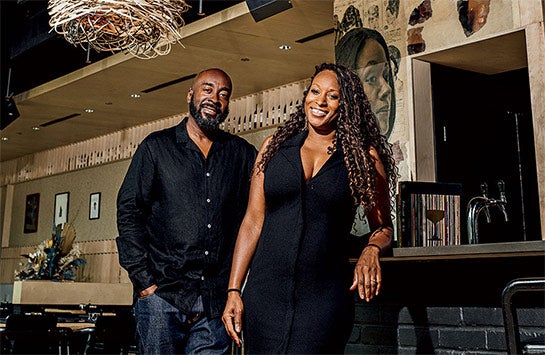
What are your top three do’s and don’ts for students who are on a path to establishing their own businesses?
I know it sounds so cliché, but do something you really love to do. I know people always say this, but I really think that it’s true. Don’t do something because it can make money. Do something you really want to do. I like making earrings. I like consulting. So, do something that you love to do.
Number two, find a way you can make it unique to you. With any business, if it’s consulting, then find a way you can make it unique. If you’re a hip-hop consultant, or if you’re a consultant that specializes in something else that’s specific or does something a certain way, what’s unique about what you do? I mean, there’s a million stores and a million restaurants. But how are these places different? We are all different and I try and make these things very personal to me. That’s how I look at businesses. They should reflect who you are.
Trusting your gut is another “do.” Trust yourself. Don’t overthink things. People overthink things way too much and I see that. They’re very hesitant to start and say, “I have to make sure I have this right. It’s got to be right…” It’s like writing an article. It ain’t gonna be perfect. I think that once you settle on something not being perfect, it’s like, you want to make it good, but it’s not going to be perfect. What does perfect even mean? So, I would say don’t do that.
I would also say try and really have a good plan for your business. Be it your financial plan or your business plan. I’ll say that I’ve seen many a business plan that didn’t work. A business plan doesn’t mean that it’s going to work, but at least you have an idea of a structure of how it should work.
Do try and be fair. Do try and be honest. Do try and do the right thing. Try and really do things the right way and don’t take shortcuts. Just go ahead and do it the right way.
The Story of Alumnus Eric Williams, BS Finance ‘93, the Businessman Behind Chicago’s Iconic Silver Room and Bronzeville Winery
What would you say is something else that readers should know about you?
You know, it’s funny. At the time, at UIC, I didn’t really think about it so much. How it put an impression on me. But I had a good time. I don’t have these vivid memories, but it was more about the time of my life while I was there that really shaped me. You think about the ages of 17, 18, 19, 20, 21, 22; those years are your coming of age, or adult years. You can go in different directions during that time. Coming back to the city, being grounded in arts and culture, and refocusing on school, set me on a good path. It’s about the school and having the time of my life while I was at the school.
In hindsight, I think being back in the city was good for me. I couldn’t afford to go to any other place. But being in Chicago in the late ’80s and early ’90s, it was the rich culture that was happening here, be it the club scene, music scene, the visual arts scene, or the poetry scene, I was really immersed in it. That was really fundamental in shaping who I am today.
The Story of Alumnus Eric Williams, BS Finance ‘93, the Businessman Behind Chicago’s Iconic Silver Room and Bronzeville Winery
Thank you tremendously, Eric, for giving us a look at your life and success.
To our students, Eric leaves you with these words of wisdom: “I want to say something that I told my daughter. This is something that I did, too. Explore everything. Get off of the campus, catch a train, get lost, go to the West Side, go to Edgewater, try some food you never had before, go to that art opening, go to museums, go to festivals, walk around, take the boat cruise, go to South Shore… Just get out and go meet people. That’s the one thing I would definitely say. Don’t be insulated. You have to be able to open up and try new things all the time. I mean, to this day, I’m always trying stuff. Still.”